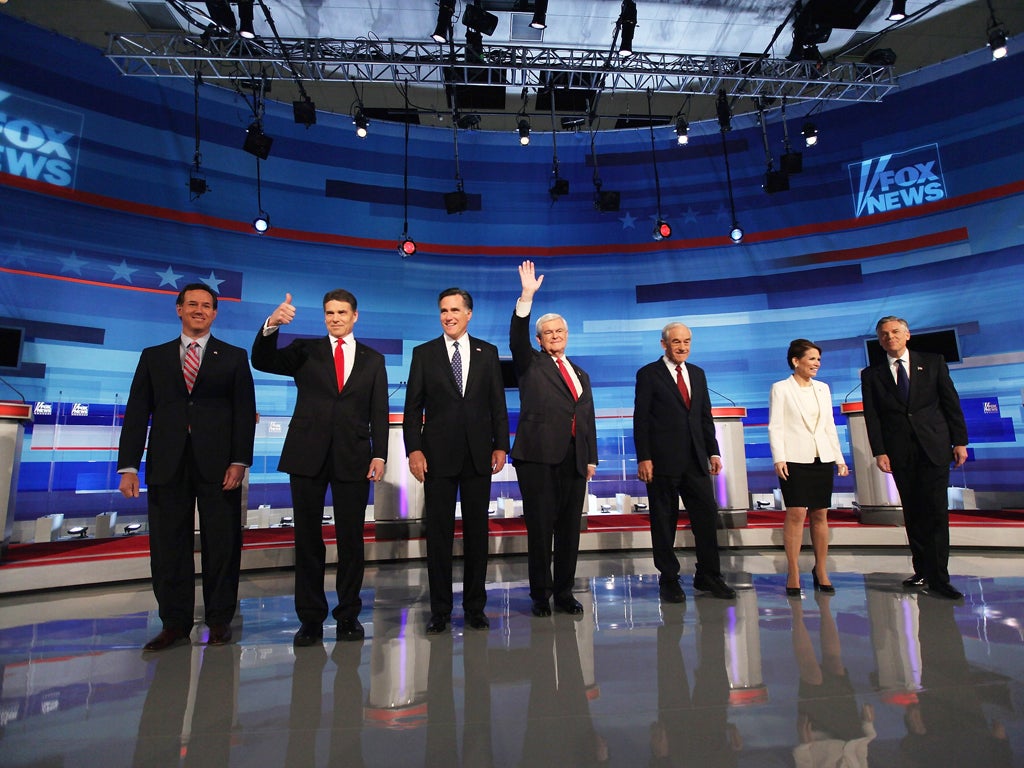Phoney war ends with Republican race still wide open
At the conclusion of the GOP's last debate, there is still no clear front-runner who can unite the party

With the final debate before the Iowa caucuses behind them, the Republican candidates for the US presidential nomination prepared to shift yesterday from phoney war to fully-fledged battle amid entirely mixed omens as to who will be the last person standing to take on Barack Obama next year.
On stage for their final televised encounter in Sioux City, Iowa, on Thursday, they managed, if anything, to make predicting the outcome even harder. Voting begins with the Iowa caucus on 3 January, followed in short order by primary elections in New Hampshire, South Carolina and Florida.
Mitt Romney, the former governor of Massachusetts who in recent days has surrendered the pole position to one-time Speaker of the House Newt Gingrich, emerged from the debate more or less unscathed and received a significant boost last night with a personal endorsement from the Governor of South Carolina, Nikki Haley, who, importantly, is beloved by the Tea Party.
All the signs are that this nomination race may become a drawn-out affair with no one amassing the necessary numbers of delegates from primary voting states until well into the spring. While all eyes now are on Mr Romney and Mr Gingrich, others could quickly scramble the mathematics, including Ron Paul, the anti-war libertarian from Texas.
The dress rehearsals over, the pressure on the Republicans to avoid snatching defeat from the jaws of victory is greater than ever. On the one hand they feel they have a real chance to oust Mr Obama next November, but on the other they just don't seem to be able to decide who they want to do it for them.
That sense of tantalising possibility was underscored by a new Associated Press poll showing that for the first time Americans are divided as to whether Mr Obama will get a second term. Worse for the incumbent, 52 per cent of adults said they did not not want to see him stay in the White House and only 43 per cent said he deserved four more years.
The most important dynamic in the coming weeks will be the extent to which Republican primary voters, who will tend towards the conservative wing, will segregate their intellectual assessment as to the electability of each of the candidates from their emotional responses to them. This most directly affects Mr Romney, who may be the sensible choice to take on Mr Obama but who leaves most conservatives cold.
It is also the issue that is likely to halt the Ron Paul train, even if the passengers on it remain vocally enthusiastic. Indeed he may have put the buffers on the line himself at the debate in Sioux City when he almost yelled his opposition to the US-led campaign to pressure Iran not to acquire nuclear weapons, arguing that sabre-rattling, which could lead to war, is why the Islamic world hates America.
The argument puts Mr Paul to the left of almost everyone on the foreign policy landscape in America, and many conservatives will be appalled. "To declare war on 1.2 billion Muslims and say all Muslims are the same, this is dangerous talk," he ventured. "Yeah, there are some radicals. But they don't come here to kill us because we're free and prosperous... They want to do us harm because we're bombing them."
The electability question also stalks Mr Gingrich, who was described by Mr Romney this week as "zany". He came under scorching criticism on the debate stage, notably from Mr Paul and Congresswoman Michele Bachmann, for his work over the past decade as a consultant to the government mortgage agency Freddie Mac, for which he collected $1.6m in fees.
Not to be overlooked is Rick Perry, the Governor of Texas, who offered the best crowd pleasing line when he compared himself to Tim Tebow, the Denver Broncos quarterback who, after being criticised before the start of the football season for being ill-prepared and sub-par, has emerged with one of the best records of any player. Watch out, Mr Perry said, because he would be the "Tim Tebow for the Iowa caucuses". We will see.
Join our commenting forum
Join thought-provoking conversations, follow other Independent readers and see their replies
Comments
Bookmark popover
Removed from bookmarks